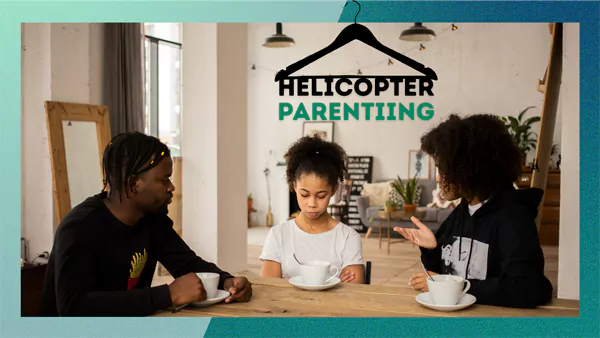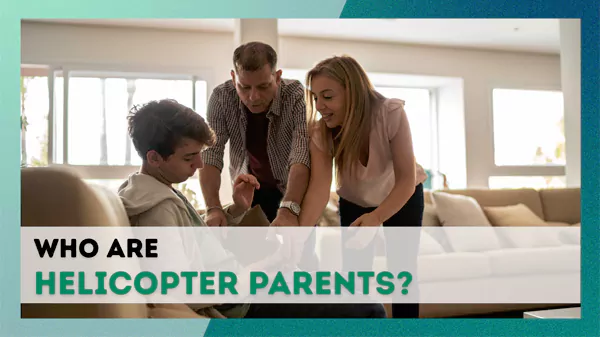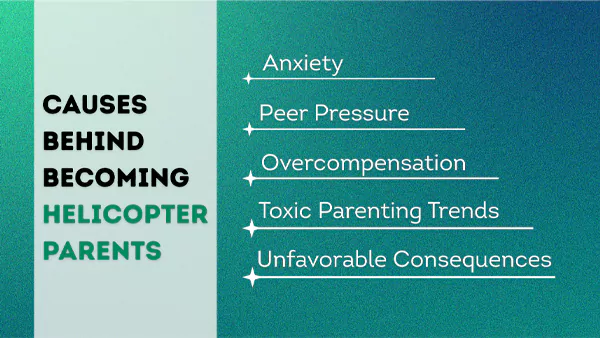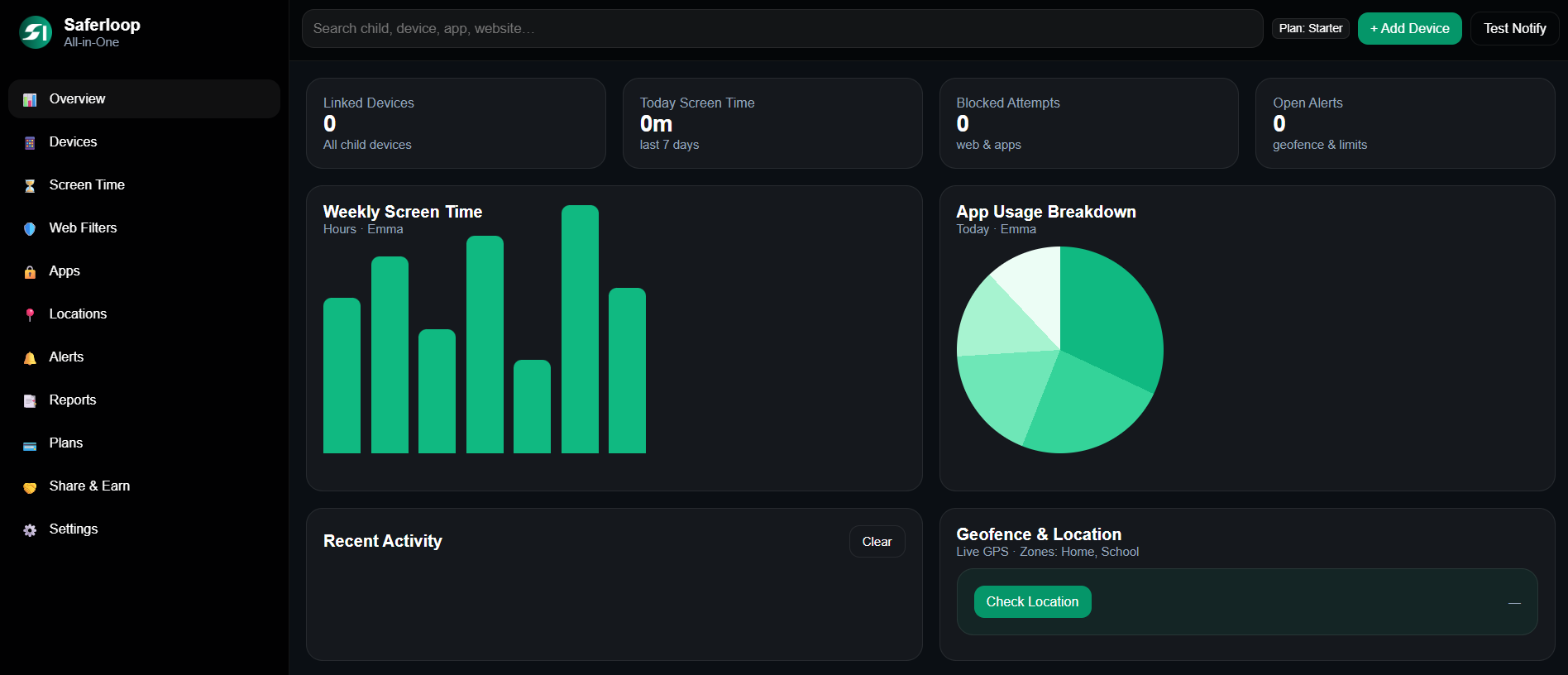Ans: The term “helicopter parents” refers to the overprotective and overpossessive parents who are very fearful and protective of their child, especially in outdoor settings where they cannot accompany them.
Who are Helicopter Parents? Explore How Helicopter Parenting Tends to Micromanage

Excessive screen time, academic negligence, risky online behavior, interaction with inappropriate content and poor sleep habits are some of the problems that I have faced with my teen. And I’m sure a majority of the parents can relate to me.
As my child explored the world on its own, my compassion and concern turned into an obsession with my child’s safety, and that’s when I became a helicopter parent.
So if you are in the same situation, it’s affecting the loving bond between you and your little angel.
Join me, as here I’ve comprehensively explained what helicopter parenting is, along with the causes, traits, and impact of helicopter parents.
Who are Helicopter Parents?

Helicopter parents are those who pays utmost attention to the child’s well-being, safety, and life. Such parents are obsessed with their child’s conduct and security, especially when their kids are not around them.
Though, the helicopter parenting is not a bad parenting style, the overprotective nature of guardians usually leads to micromanagement of teens’ activity, which can affect the minor’s confidence and coping skills. Furthermore, this hypersensitive nature doesn’t give the children enough exposure to tackle struggles and disappointments.
As a result, they are unable to build resilience and other life skills. The worst part is, this possessive behavior also creates drifts in the loving relations of parents and children.
Hence, you need to know the traits of helicopter parents to get a holistic understanding of ‘what is helicopter parenting.’
Key Traits of Helicopter Parents
Parenting is an art, and usually, guardians have different ways to discipline and interact with their child. However, to help you differentiate whether your style aligns with helicopter parenting, I’ve laid down some notable behavioral characteristics of helicopter parents!
- Interfering with a teen’s privacy by cleaning their room.
- Helping kids resolve their conflicts with their friends.
- Strictly tracking their diet.
- Not letting them even make small decisions for themselves.
- Monitoring their homework, assignments, and even school projects.
- Not letting them go on trips or other outings with friends.
- Constantly checking on them, especially when they are at a party or hanging out with friends.
Also Read: What is Parental Advisory? Detent an Explicit Content So It Doesn’t Harm Kids
Why Do Parents Become Helicopter Parents?

Excessive monitoring and indulgence in the minor’s life hampers their growth and, in most cases, compromises the emotional bonding. To determine why this method is not appropriate, you’ll need to understand the causes triggering such behavior in guardians.
Here are the causes behind the over-obsessive behavior of helicopter parents!
- Anxiety: Constant worries about the prevailing disparities and evils of society encourage the guardians to take more control of their ward’s life so that they can help them make mindful decisions derived from their personal experiences.
- Fear of Unfavorable Consequences: The caregivers are afraid of their little one’s being rejected or failing in something. They simply want to protect their little angels from the bad feelings that can trigger depression or induce uneasiness.
- Overcompensation for Their Childhood: When parents are neglected at an early age, they try to make sure their teens don’t face the same. As a result, they end up overcompensating for their childhood as well.
- Toxic Parenting Trends: When guardians are themselves treated with strict parenting, sometimes they perceive it as a natural and ideal method of raising kids; hence, they impose similar regulations, restrictions, and methods on them as well.
- Peer Pressure: When guardians see fellow parents being involved with their kids, they crave a similar relationship and try to overdo it, which leads them to unhealthy helicopter parenting.
Advantages and Disadvantages of Helicopter Parenting
Helicopter parenting comes with a distinctive set of advantages and disadvantages, so to get the best out of this method, you need to be aware of its pros and cons. This way, you’ll be able to connect with your child without compromising their growth.
Here’s a quick sneak peek into the strengths and limitations of helicopter parenting based on the helicopter parents’ behavior.
| Advantages | Disadvantages |
| Have high safety awareness, as the parents are extremely attentive towards their youngsters. | Low independence, as the guardians undermine the child’s ability to take initiatives and make decisions for themselves. |
| Ensures strong academic support from guardians, which ultimately improves academic performance. | Increases anxiety and pressure because the child has low self-confidence and is afraid of failure. |
| Enables quick problem resolution as the parent intervenes to offer a sense of security and comfort. | Results in poor problem-solving skills in kids, as they have never faced any challenge on their own. |
| Supports a structured environment for cognitive development with clear routines, expectations, and guidance. | Strains the relationship between parent and child, especially with teens, due to overcontrol, and leads to resentment and rebellion. |
| Fosters emotional availability in parents. | Delays emotional maturity in children, as they never had the autonomy of making decisions for themselves. |
| Hampers the development of teenagers’ personalities, as they have never developed resilience and other practical skills. |
Remember that balance is the key, and you need to give your little fellow the space to grow where they can learn at their own pace, fail, and restart all over again. It’s okay for everyone to make mistakes, and you shouldn’t be harsh on your minors for that.
The ultimate goal should always be guidance, not control. That way, you’ll be able to protect your kid without straining your relationship.
Let’s explore some of the tactics that you can opt for to safeguard your child without breaching their privacy in the subsequent section.
Also Read: 13 Best Android Parental Control Apps in 2025 | Unleash Cybersecurity With These Recommendations
How to Support Your Teen Without Breaching Their Privacy?
So far, I’ve learned that supporting teens without crossing the boundaries involves a lot of trust building, healthy communication, and, most importantly, mutual respect. Hence, the following are some ways through which you can be supportive of your child without violating their privacy.
- Listen Carefully and Have Open Communication: Don’t impose your values, beliefs, and opinions on them. Instead, listen to them carefully and help in finding a possible solution without taking over the control of the situation. Do not interrogate or scold your child; instead, guide them on how they can avoid such problems.
- Be a Mentor, Not a Dictator: Never make decisions on behalf of your child. Instead of interrogating, ‘What are you doing?’ try asking, ‘Do you need any help figuring that out?’ It will foster the feeling of empowerment rather than surveillance.
- Don’t Micromanage: There’s no need to track their homework, food habits, studying schedule, online interactions, and other activities they do. It will inculcate a sense of autonomy and competence in them.
- Let the Natural Consequences Unfold: Let them face the consequences of their actions. It will assist them in making better decisions in the future. Don’t intervene unless it’s a life-threatening situation.
- Validate Their Emotions: Ask your teens how they are feeling and, without rushing them to fix things, just calmly listen to them and show some empathy and love.
- Allow Them to Fail: Failure is the best teacher, so let your child fail and experiment with success. It will enable them to interact with new people and teach them greater life lessons. Furthermore, it will also immunize them to rejection and help them develop resilience.
- Get Parental Control Software: For their digital safety, get effective parental control software like SaferLoop. It will block inappropriate content and websites, manage their online interactions, foster healthy screen habits, create safe zones, and alert you in case of an emergency.
Respecting privacy doesn’t mean turning a blind eye to upcoming threats. Immediately step in to take control if you observe the signs of:
- Isolation
- Depression or anxiety
- Drastic mood shifts
- Risky behavior
- Substance abuse
Wrapping Up!
Parenting today’s tech-savvy generation is quite a task, especially when the digital landscape is cluttered with predators sitting in ambush.
But being overprotective and worried is not the solution, as it will only distance you from your child. That’s when parental software like SaferLoop comes in handy, as it safeguards your little one without breaching their privacy.
So what are you waiting for?
Get SaferLoop to stay worry-free while your kid explores the magic of the virtual world!!
Also Read: Is Snapchat Safe for Kids? Here’s What Parents Should Know About This Social Media Platform
Frequently Asked Questions
Q: What is considered a helicopter parent?
Q: What are the 4 types of parents?
Ans: Mainly, there are four types of parenting styles; they are as follows:
- Authoritative parents
- Authoritarian parents
- Permissive parents
- Uninvolved parents
Q: What are helicopter parents called now?
Ans: In other words, helicopter parents are cosseting parents or cosseters, who are overattentive and overly scared for their kid’s well-being, especially outdoors.
Q: What is a dolphin mom?
Ans: Dolphin moms are the mothers who emphasize balance and emotional connection to support their child’s growth. It’s basically a middle ground between tiger parents (authoritarian) and jellyfish parents (permissive).
Q: What is the most successful parenting style?
Ans: The authoritative parenting style is generally considered the most successful one. Though it’s not ideal, it ensures a balance between high expectations with responsiveness and warmth, which fosters healthy cognitive development and positive results in children.
